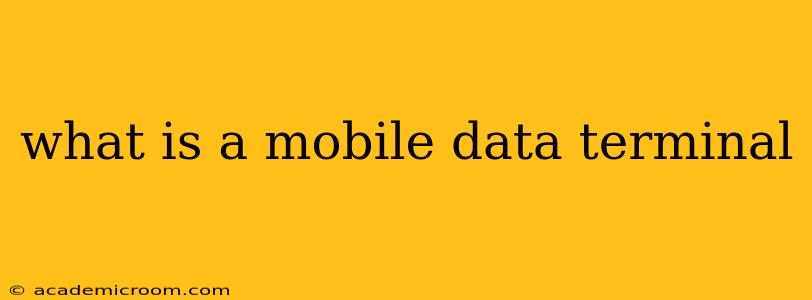A Mobile Data Terminal (MDT) is a device that allows for the transmission and reception of data while in motion. Think of it as a mobile computer specifically designed for use in vehicles or other mobile environments, providing access to crucial information and communication capabilities. Unlike a simple smartphone, MDTs are typically ruggedized for durability and optimized for specific applications demanding reliable connectivity and data processing in challenging conditions.
What are the different types of Mobile Data Terminals?
MDTs come in various forms, each tailored to different needs and applications. Some common types include:
-
In-vehicle MDTs: These are commonly found in vehicles such as police cars, ambulances, delivery trucks, and taxis. They often integrate with vehicle systems, providing access to mapping, dispatch information, and other relevant data. These are usually robust devices designed to withstand vibrations and temperature fluctuations.
-
Handheld MDTs: Smaller and more portable, handheld MDTs offer similar functionality to in-vehicle units but are designed for greater mobility. They are used in various applications, such as field service, logistics, and delivery. Durability and battery life are key considerations for these types of MDTs.
-
Ruggedized MDTs: Built to withstand harsh conditions, ruggedized MDTs are designed to operate in extreme temperatures, dusty environments, or even wet conditions. They are typically used in demanding applications such as construction, mining, or emergency response.
-
Specialized MDTs: These MDTs are tailored for specific industries or applications, such as public transportation, warehousing, or healthcare. They often include features and software customized to meet the unique needs of these sectors.
What are the key features of a Mobile Data Terminal?
Several key features distinguish MDTs from standard mobile computers:
-
Robust Design: MDTs are typically built to withstand harsh environmental conditions, including shock, vibration, and extreme temperatures.
-
Reliable Connectivity: Strong and reliable connectivity is crucial. They often support multiple communication technologies such as cellular, Wi-Fi, and satellite communication.
-
Data Security: Data security is paramount. MDTs often incorporate encryption and other security measures to protect sensitive information.
-
Ergonomic Design: Despite being rugged, MDTs prioritize usability with intuitive interfaces and ergonomic designs for ease of use.
-
Integration Capabilities: Many MDTs integrate with other systems, such as vehicle diagnostics, GPS tracking, and dispatch software.
What are the benefits of using a Mobile Data Terminal?
The advantages of using an MDT are numerous:
-
Improved Efficiency: Real-time access to information streamlines workflows and reduces delays.
-
Enhanced Communication: Facilitates seamless communication between mobile workers and dispatchers or other teams.
-
Increased Productivity: Mobile workers can complete tasks more efficiently with readily available information.
-
Better Data Collection: Accurate data capture improves record-keeping and reporting.
-
Improved Decision-Making: Real-time data and information enhance decision-making capabilities.
What are some common applications of Mobile Data Terminals?
MDTs find applications in a wide range of industries, including:
-
Law Enforcement: Police officers use MDTs to access criminal databases, dispatch information, and other critical data.
-
Emergency Services: Ambulance crews and firefighters use MDTs to access patient information, locate emergency sites, and coordinate responses.
-
Transportation and Logistics: Delivery drivers, truckers, and public transportation operators use MDTs for navigation, dispatch communication, and tracking shipments.
-
Field Service: Technicians and service personnel use MDTs to access manuals, schematics, and other information required for repairs and maintenance.
-
Healthcare: Healthcare workers may use MDTs to access patient records, order supplies, and coordinate care.
How does a Mobile Data Terminal differ from a tablet or smartphone?
While tablets and smartphones offer some similar functionalities, MDTs are distinguished by their robust design, dedicated communication capabilities, and often specialized software tailored to specific applications. Tablets and smartphones generally lack the ruggedness and integration capabilities necessary for many MDT applications. They are also not optimized for the constant vibration and movement experienced in many MDT use cases.
In conclusion, a Mobile Data Terminal is a specialized device optimized for data access and communication in mobile environments. Its robust design, reliable connectivity, and integration capabilities make it an indispensable tool in many industries.
